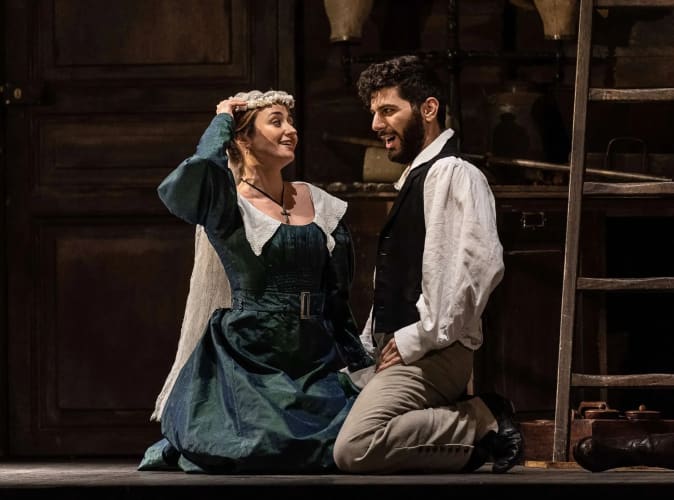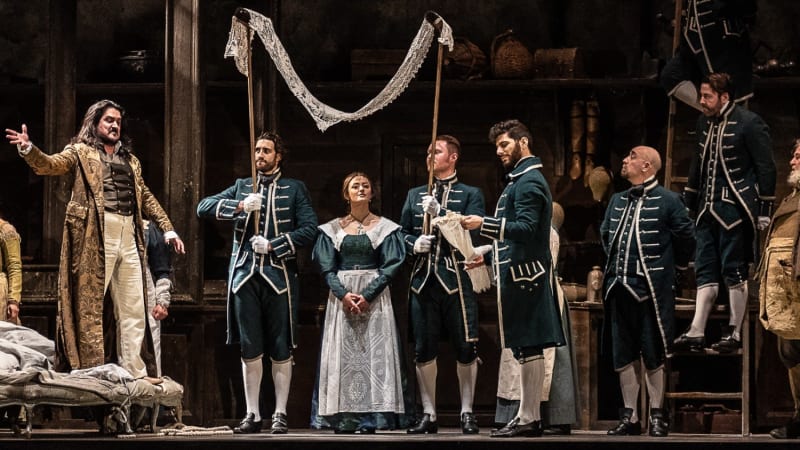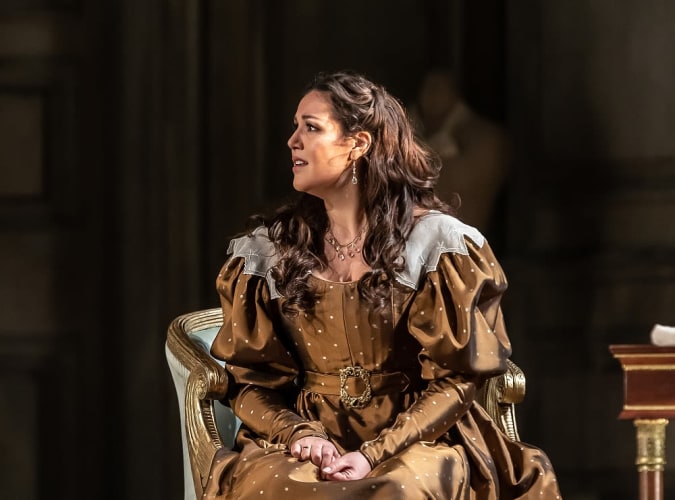With the number of performances around 100, David McVicar’s production probably ranks as the most successful ever staging of Mozart’s comic masterpiece of social commentary. And on current showing, it is also the best to be seen in any format.
McVicar projects the work forwards from the 18th century to just before the 1830 French revolution that abolished the hereditary Bourbon monarchy, just as Figaro wishes to abolish Count Almaviva’s droit de seigneur. In the grand salon of his chateau, a mini-drama worthy of Downton is acted out from the overture onwards as bustling servants gossip, flirt, eavesdrop, misbehave and mask resentment in deference.
In this mildly subversive environment, the women are smarter than the men, the servants more savvy then their master, so it is no surprise that the household should come together to shame the miscreant count.
Other directors have in recent times and in a variety of settings made less of the social aspect and more of the sex: the raunchy 1960s at Glyndebourne (2012); principals at Flanders (2023) spent most of their time in underclothes; at Salzburg (2023) it seemed all were in lust with the count; Hanover (2022) featured simulated intercourse and Aix (2021) walking penises!
Here, however, a slapped behind, a tickle under a chin are enough to indicate the nature of Almaviva’s misdemeanours. It is typical of McVicar’s subtle approach, seen elsewhere when a few falling leaves are sufficient to suggest the garden scene, although designer Tanya McCallin’s interior set remains in the background.
A young, good-looking, mainly Italian cast do the production justice in this 2023 revival, in which Giulia Semenzano perfectly captures the spirit and vulnerability of Susanna. One sees in her expression the fear of a maid who realises the real danger she faces at the hands of a lascivious boss, and later her mischievous joy at the revelation that Figaro is the son of Marcellina, the woman he was so nearly forced to marry. One of the opera’s highlights is her beautiful legato singing of the garden aria.
Bass Riccardo Fassi has a quiet entrance, somewhat understating the high C and F in "Se vuol ballare", but is commanding thereafter, an exuberant figure but a suddenly deflated one as he listens to what he believes is Susanna’s betrayal. The moment when this scheming but previously obedient servant shouts No to Almaviva is powerful enough to signal a revolution.
German E Alcantara makes the count an unscrupulous but humorous rather than loathsome character, unaware of his own pomposity and thinking himself more attractive to women than he really is, while Federica Lombardi invests the countess with a serene pathos.
Hanna Hipp is a convincing Cherubino—whose flight from a window is marked with a delicious downward glissando on the harpsichord by conductor Tony Pappano—with Alexandra Lowe, surely a future Susanna, a delightful Barbarina. Supporting parts are equally well sung and acted, with Monica Bacelli as a spirited, comedic Marcellina and Gianluca Buratto showing a smoothness of delivery throughout the range as a Bartolo who—given what is to follow—fortunately still has the hots for her. Gregory Bonfatti is the painted fop Basilio and Jeremy White, who looks like he has come directly from the cabbage patch, a crotchety Antonio.
Fassi previously appeared as Figaro in an unfathomable Berlin production of 2021 that appears to be set among rock stars at a modern health club. Of the other nine available with English subtitles that I have tracked down from the last 20 years, there are as many Figaros, as many Susannas etc as there productions or directors.
Nikolaus Harnoncourt did away with directors entirely for a semi-staged version he mounted in Vienna in 2014, two years before his death, that gives insight into recitative singing but fails to bring out the social drama. Of the remainder, Jürgen Flimm’s 2015 production, conducted in Berlin by Gustavo Dudamel, has great charm, with the count cast as an immature latin lover in the 1920s, but at the cost of soft-pedalling the class conflicts.
I found not a lot of difference in the quality of the singers, with the possible exception of the magnificent Marlis Petersen in Richard Eyre’s fine production for the Met in 2014, set in Seville in the 1960s in which her Susanna playfully beats up the faithless Figaro in the final scene. It would make a good second choice.
The Royal Opera version is not without its small flaws—Pappano’s conducting is fluent and vivacious, but the sound balance, especially in the first two acts, too heavily favours the orchestra over the singers. But as a concept that matches the nuances of Mozart’s music with the those of its libretto, it is hard to beat. The set, which easily accommodates the former linen room destined to become Figaro and Susanna’s married quarters, the reception hall and other rooms, all superbly illuminated by Paule Constable’s lighting, is perfect for its purpose.
The disk has the benefit of extra features by Pappano and McVicar, who obviously love working together, the director returning regularly to take charge of revivals and make small changes here and there. One of them, I suspect, is having this Susanna stand on a box to impersonate the taller Countess, a little touch within a grander concept that constantly delights.



